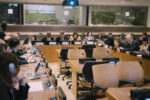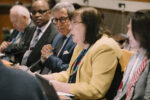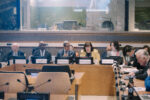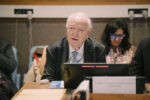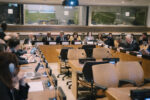Remarks by Under-Secretary-General Miguel Ángel Moratinos,
High Representative for the United Nations Alliance of Civilizations
and UN Special Envoy to Combat Islamophobia,
on the High-level Event to Commemorate the International Day for Countering Hate Speech
16 June 2025, United Nations, New York, Conference Room 5
Your Excellency, Under-Secretary-General Virginia Gamba,
UN Special Advisor on the Prevention of Genocide;
Your Excellency, Amb. Omar Hilale,
Permanent Representative of the Kingdom of Morocco to the United Nations;
Excellencies,
Distinguished Delegates,
It is both an honour and a responsibility to join you today as we mark the 4th International Day for Countering Hate Speech. I am particularly pleased to join distinguished colleagues, including USG Viriginia Gamba, the UN Special Advisor on the Prevention of Genocide and Amb Omar Hilale, the Permanent Representative of the Kingdom of Morocco, whose principled leadership continues to advance the work of the United Nations in its fight against hate speech.
This meeting takes place in a global context marked by deepening polarization, the resurgence of identity-based hate, and growing distrust within and among communities. In such a climate, religious and cultural diversity — which should be a source of enrichment — is too often manipulated to divide, exclude, and even incite violence.
We are gathered today to address one of the most pressing challenges of our digital age: the proliferation of hate speech and the emerging role of Artificial Intelligence in shaping — and sometimes distorting — our public discourse.
Around the world, we have seen this unfold in many disturbing ways: Physical and verbal attacks against persons and communities based on their religion, belief, race, or identity. These unjustifiable patterns were manifested in attacks on places of worship and sacred sites including synagogues, mosques, churches and temples; Quite often, properties and cultural institutions affiliated with specific communities were targeted. We have also witnessed a disturbing spike in the vilification of minority communities in mainstream and social media; and the rising normalization of hate speech and dehumanizing rhetoric in political discourse.
This reality compels us to reaffirm a fundamental truth: there is no hierarchy of hatred. All forms of religious and racial discrimination are unacceptable, and all must be addressed with equal urgency and resolve.
I wish to underscore the pivotal role UNAOC platforms play in this effort. Since its inception, UNAOC has worked to advance understanding across cultural and religious divides, to prevent identity-based violence, and to support communities in building inclusive, peaceful societies.
Today, I wish to highlight two important milestones that mark our continued commitment to this mandate.
First, UNAOC has developed the United Nations Action Plan to Enhance Monitoring and Response to Antisemitism — launched in January 2025 in close consultation with relevant UN entities including the Office of the Special Advisor for Genocide Prevention, OHCHR and Department of Global Communications as well as major Jewish organizations, and Envoys to Combat antisemitism. I was honored to be designated by the Secretary General in 2020 as the UN Focal Point on Monitoring Antisemitism and Enhancing a System-wide Response, with a clear mandate to build on and strengthen existing work by the United Nations and further develop recommendations for action points to carry this work forward. At this stage, I am very pleased that my office is working closely with the office of the Special Advisor for the Prevention of Genocide and the UN College Staff to develop an on-line learning module and we hope to be able to launch it before the fall.
Second, I speak to you in my newly designated role as United Nations Special Envoy to Combat Islamophobia, a responsibility entrusted to me by the Secretary-General. This appointment reflects a growing awareness of the bigotry and dehumanizing rhetoric that Muslims have to quite often face in many parts of the world for no other reason than their faith. Muslims are challenged with Institutional discrimination and socio-economic restrictions in several non-Muslim majority countries.
Hate speech drives wedges between communities, sparks fear and anger and may often lead to violence which threatens peace and stability in societies.
Based on International Human Rights, hate speech online and offline that amounts to advocacy of national, racial or religious hatred that constitutes incitement to discrimination, hostility or violence is prohibited.
At this point, digital platforms have a responsibility to moderate hateful content and protect users from harassment without infringing on the freedom of expression.
As Special Envoy, I will work to ensure that the United Nations responds with moral clarity and operational coherence. Our approach will be informed by evidence, rooted in human rights, and focused on supporting Member States and civil society in developing meaningful, result-oriented approaches. Just as with antisemitism, the fight against Islamophobia requires more than condemnation; it requires capacity, consistency, and courage.
Distinguished delegates,
The United Nations Alliance of Civilizations has long recognized that hate speech is not merely a matter of words — it is a precursor to violence, exclusion, and in some cases, atrocity crimes. When hatred is normalized — whether on the streets or in cyberspace — it chips away at our shared humanity.
What is new, and increasingly urgent, is the scale, speed, and sophistication with which such speech spreads — enabled by algorithms, amplified by bots, and shaped by artificial intelligence systems that often operate without transparency or accountability.
AI has the potential to be a powerful tool for good — to detect harmful content, translate across cultures, and expand access to knowledge. But left unchecked, it can also reinforce bias, automate discrimination, and fuel the very narratives we seek to dismantle.
Recognizing both the immense potential and the challenges posed by AI, the United Nations has undertaken significant steps to ensure its ethical and inclusive development.
The Global Digital Compact, adopted at the Summit of the Future last year, sets a comprehensive framework to guide digital cooperation and AI governance, highlighting 3 key objectives: (1) inclusive development; (2) fair and equitable access; and (3) establishing transparency guidelines and accountability measures. To quote the United Nations Secretary-General, Mr. Antonio Guterres, “It brings the world together around a shared vision: One where technology serves humanity, not the other way around.”
Other efforts across the UN System — including the Secretary-General’s High-Level Advisory Body on Artificial Intelligence, UNESCO’s Recommendation on the Ethics of Artificial Intelligence, and the International Telecommunication Union’s flagship “AI for Good” programme — similarly emphasize the importance of global solidarity in the development and governance of AI.
In support of these efforts, I highlighted “the human dimension of AI” as a new priority area in the UNAOC Plan of Action 2024-2026, which I presented to the UNAOC Group of Friends last year. At, UNAOC, we focus on enforcing the Human aspect into Artificial Intelligence. So I convened 3 Global Dialogues in Geneva in 2023, 2024 and in April 2025. We brought together member states, UN entities and AI experts in a series of dialogues to exchange views on the pros and cons of AI.
Excellencies,
Our response to the challenges posed by hate speech must be unified and indivisible. Antisemitism and Islamophobia — along with other forms of religious intolerance and racial hatred — often stem from the same toxic ecosystem of fear, misinformation, scapegoating, and political opportunism. They are not isolated crises. They are interrelated symptoms of a broader erosion of empathy and solidarity in our societies. Manifestations of hatred are often amplified by AI-driven content. Content driven AI demonstrates how prejudice can be programmed — and how silence can become systemic.
In the same vein, we cannot outsource our moral judgment to machines. Nor can we afford to treat online hate as a virtual problem with no real-world consequences. The genocide in Rwanda was preceded by hate speech on radio. Today, such speech travels faster and further — and we must be just as vigilant.
That is why our efforts must not be siloed. They must be mutually reinforcing.
In this regard, I commend the initiatives of Member States — including the Kingdom of Morocco — that continue to champion interfaith dialogue and multicultural coexistence at the national and international levels. These efforts demonstrate that promoting harmony is not a soft ideal. It is a strategic imperative for peace, resilience, and sustainable development. I recall, UNAOC 9th Global Forum which was hosted by the Kingdom of Morocco in the historical city of Fez, was a powerful symbol of cultural and religious diversity as it should be.
Looking ahead, the United Nations Alliance of Civilizations remains committed to strengthening partnerships with Member States, faith leaders, youth organizations, and academic institutions. Through education, dialogue, and grassroots engagement, we aim to build societies in which diversity is embraced as a virtue — not feared as a threat.
Let us remember: hatred may begin with words, but it always ends with violence. If we are to be true to the UN Charter and the Universal Declaration of Human Rights, we must move from intention to action — from rhetoric to responsibility.
In closing, let us remind ourselves: technology reflects our values. If we want algorithms to promote empathy, we must first encode empathy into our institutions and our policies.
We must ensure that in the age of artificial intelligence, it is human intelligence — and above all, human conscience — that guides us.
I thank you.

